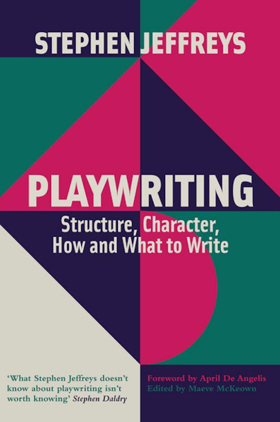Book Review: PLAYWRITING, Stephen Jeffreys

Stephen Jeffreys was sadly lost to us at the end of last year, but in his book Playwriting, edited and compiled from his notes and plans by Maeve McKeown, he has left behind a lasting legacy.
Playwriting feels like a love letter to theatre and the craft of writing for the stage. It offers encouragement to new, emerging and struggling playwrights, and exudes an unexpectedly paternal affection to the reader.
The book has been completed by editor and script consultant McKeown as, sadly, Jeffreys did not manage to complete it with her before succumbing to a brain tumour in September 2018.
His long-awaited book is a manual based on material from his Playwriting Masterclasses, as well as a lifetime of experience working in theatre. The panoptic Playwriting is abundantly testified by names such as Simon Stephens, April De Angelis and Roy Williams.
Jeffreys' own introduction explains how the book was born from his belief that all existing playwriting guides since Aristotle's Poetics are either over-simplified or too academic. The body of the book is practical playwriting advice and direction. It ranges from structure and dialogue to subtext and Jeffreys' 'Nine Stories' theory.
However, the book also incorporates sections of intense reflection - not only on contemporary theatre and its audiences, but also on the playwright and their motivations. Indeed, the book as a whole is rather a dramaturgical appraisal of playwriting as an institution; not only how to structure your play, but also how to approach, evaluate and understand it in relation to contemporary theatre.
Each section is engagingly introduced and achieves a sense of immediate currency with references to Netflix and the new structures of stories emerging from modern mediums. These are the stories that plays are now in competition with.
Jeffreys makes his method accessible by explaining traditional, more prescriptive approaches and then exploring ways and reasons to subvert them. The book is almost overwhelmingly thorough, including diagrams, approaches and pitfalls and a plethora of references. Jeffreys does not let a strategy go by without providing a referenced example for the reader to see his point in practice.
McKeown acknowledges Jeffreys' propensity for referencing white males in her Editor's Note alongside her endeavour to redress this (following his own admission of the issue). While some variety is found, they still seem to lie overwhelmingly in the former category, and this is perhaps all the more noticeable due to the work being saturated by references.
The book is clear and relatively concise. It encourages thorough reading rather than any kind of dip-in-dip-out approach for those seeking gentle guidance. However, each page has at least one piece of invaluable advice that can be taken away and built on.
Overall, Stephen Jeffreys' Playwriting is a masterfully adept and complete guide to not only finding what you want to write about, but also how to do it.
Playwriting: Structure, Character, How and What to Write by Stephen Jeffreys published by Nick Hern Books, available from 18 April
Add Your Comment
Videos
